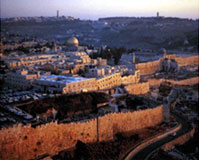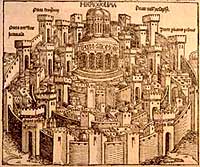
|
||
|
|
Basics
Start Here
Anglicans Believe ...
The Prayer Book
The Bible
News
News Centre
News Archive
Newspapers Online
Official Publications
Resources
Resources A to Z, including
Biblical Study
Book of Common Prayer
Books and Magazines
Exchanges
Events
Liturgy
Music
Religious Orders
Preaching
Theology
Youth
Worldwide Anglicanism
Anglican Communion
In Full Communion
Not in the Communion
Dioceses and Parishes
Africa
Australia
Canada
England
Europe
Ireland
Japan
New Zealand
Scotland
USA
Wales
World
Anglicans Online
Archives
Add a Site to AO
Tell Us What You Think
Link to AO
Staff
Awards and Publicity
Beginnings, AO Today
Our Sponsors
Hallo again to all.
 The
news this week includes stories about the Archbishop of Canterbury's visit to Jerusalem. Last year Pope John
Paul II visited there. In the year AD 333, someone known as 'the anonymous pilgrim of Bordeaux' left the oldest
surviving written record of such a pilgrimage. Since then, there have been well-documented visits by Egeria, Arculf, Nasir-i-Khusraw,
Marco Polo, Henry Timberlake, Lady Stanhope, Mark Twain, and thousands more. Millions more have made the pilgrimage without writing about
it, except perhaps to their families. One might even view the Crusades as a form of pilgrimage.
The
news this week includes stories about the Archbishop of Canterbury's visit to Jerusalem. Last year Pope John
Paul II visited there. In the year AD 333, someone known as 'the anonymous pilgrim of Bordeaux' left the oldest
surviving written record of such a pilgrimage. Since then, there have been well-documented visits by Egeria, Arculf, Nasir-i-Khusraw,
Marco Polo, Henry Timberlake, Lady Stanhope, Mark Twain, and thousands more. Millions more have made the pilgrimage without writing about
it, except perhaps to their families. One might even view the Crusades as a form of pilgrimage.
Although the Holy Land vied with Rome and Santiago in the Middle Ages as a top pilgrimage place, Jerusalem took first honours, perhaps partly because Jerusalem represents both the actual and the heavenly, the spiritual centre of the earth.
In the Middle Ages a pilgrimage was often a means of earning merit points to erase sins (think Tannhauser), but surely there were times when pilgrims (albeit mostly those with money) merely wanted to see, walk, sleep, touch, and live amongst the boundaries of the world of Our Lord. If motives were pure, journeys were arduous, vulnerable to thieves and predators, dotted with dirty and overpriced hostels, and subject to the merciless elements of nature. Pilgrims came from farther away than we might realise: a stone in Sweden bears the eleventh-century inscription: 'Estrid had this stone raised for her husband Osten; he went to Jerusalem and died abroad in the land of the Greeks'. For those who could not go the distance, treading labyrinths in cathedrals became a sort of Pilgrimage Lite.
But what is it about an actual visit to the Holy Land that is so eternally magnetic? In about AD 600, a man named Sophronius wrote a poem that included these lines*
|
Jerusalem, how I long to stand even now at your gates, and go in, rejoicing! Let me walk thy pavements I will venerate the sweet floor, |
pour from that Rock where Mary handmaid of God, childbearing for all men, was laid out in death. Hail, Sion, radiant Sun of the universe! There, after shattering hell, |
 In
much writing about Jerusalem, the boundaries of earth and heaven become blurred: Jerusalem the blest ... there Our Lady sings Magnificat ...
milk and honey ... jewelled streets ... Place? Or dream? Both.
In
much writing about Jerusalem, the boundaries of earth and heaven become blurred: Jerusalem the blest ... there Our Lady sings Magnificat ...
milk and honey ... jewelled streets ... Place? Or dream? Both.
Jerusalem is that country at the end of our earthly pilgrimage. And what better travel guide than Mr Valiant-for-Truth in Pilgrim's Progress? On the day he realises he is to die, he says to his friends:
'I am going to my Father's; and though with great difficulty I am got hither, yet now I do not repent me of all the trouble I have been at to arrive where I am. My sword I give to him that shall succeed me in my pilgrimage; and my courage and skill to him that can get it. My marks and scars I carry with me, to be a witness for me that I have fought his battles who now will be my Rewarder'.
When the day that he must go hence was come, many accompanied him to the riverside; into which as he went he said, 'Death, where is thy sting?' And as he went down deeper, he said, 'Grave, where is thy victory?' So he passed over; and all the trumpets sounded for him on the other side.
And there is no better end to a pilgrimage than that.
We are delighted to feature in New This Week more parishes in the USA than you could ever make a pilgrimage to (thanks again to Mimi Bennett-Aronson), a number of interesting reads in Worth Noting, and a scattering of other Anglican-related web sites well worth your time to visit.
We thought briefly about opening this week's letter like this:
Hi! How are you?
I send you this file in order to have your advice
and then closing with:
See you later. Thanks
That is the signature of the SirCam virus. We at Anglicans Online were sent more than 100 copies of the SirCam virus last week. Though it didn't infect our computers, we worry that a number of our readers' computers are blighted with this dreadful thing. If you use a PC rather than a Mac, you should check the Symantec or McAfee pages on this virus, even if you think you escaped it.
See you next week.
 |

|
| Cynthia McFarland cmcf@anglicansonline.org |
reid@anglicansonline.org |
*Translation by John Wilkinson, from Jerusalem Pilgrims before the Crusades, 1977.
Last updated: 29 July 2001
URL: http://anglicansonline.org/